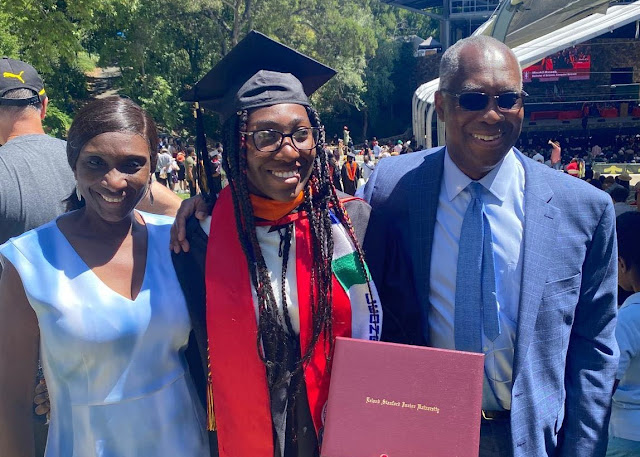The great Ngũgĩ wa Thiong'o has passed away
The great Ngũgĩ wa Thiong'o has passed away.
Ngugi is one of the figures who made me fall in love with African literature. I read his novels in high school, and it was from "Weep Not, Child" and "A Grain of Wheat" that I first learned about Kenya.
And when I later attempted to write about African cultural studies as a PhD student, his work, in general and especially his collectively authored play, "I Will Marry When I Want," and the Kamirithu Centre, were instrumental in my articulation of what African cultural studies could be.
One never thinks they will actually get to meet their heroes, so I was beside myself with excitement when Ngugi was invited to give the keynote address at the 2007 conference of the Association for Commonwealth Literature and Language Studies at the University of British Columbia (UBC).
I was asked to provide a response to his talk.
After his talk, Ngugi made some excuse about needing rest and asked me to leave with him.
Rather than going back to his hotel room, he actually wanted me to walk the campus with him, including visits to the bookstore (where, mercifully, there were copies of his work).
We had the longest talk about individual African countries, collective Africa, and pan-African politics.
I was astonished that he displayed in-depth knowledge of the history and current issues in my native Sierra Leone.
It felt like a dream to have this long chat with him as we sat outside, surrounded by students who walked by.
I wanted to shout- "Can you see who I am with, who is talking and laughing with me? Can you believe it?"
The next time I met him, we were on an invited plenary panel of the Postcolonial Education Special Interest Group of the American Educational Research Association in San Diego in 2009, where he greeted me as a long-lost brother.
Perhaps I can be forgiven for not remembering the details of those talks, neither his nor mine, swept up as I was by the very presence of the man and my astonishment at his very genuine modesty.
He was the most down-to-earth person and always keen to hear from and engage with others, as if his much-anticipated talks were simply an excuse to meet and learn from others.
And finally, in the most sustained way, I was invited by Tim Reiss to contribute to a book about Ngugi and his relationship to and reception in the Americas.
And Ngugi himself was part of the collective.
This was for all of us, truly a labor of love, and that essay remains one of the most important I have ever written in terms of its meaning to the project, which was a rigorous celebration of a towering figure who refused to be so identified.
And the pictures I have taken with him have always been significant and have now become some of my most treasured images.
To a fearless, radical social justice advocate and avid pan-Africanist, I say, Rest in Power!
Further reading:
Association for Commonwealth Literature and Language Studies (Vancouver) August 2007. Invited to act as respondent and discussant for conference keynote address. Discussed and responded to Keynote by Ngũgĩ wa Thiong'o.
Association for Commonwealth Literature and Language Studies (Vancouver) August 2007. Invited to act as respondent and discussant for conference keynote address. Discussed and responded to Keynote by Ngũgĩ wa Thiong'o.
American Educational Research Association (San Diego), April 2009. Postcolonial Education Special Interest Group. Invited Plenary Panel: Postcolonial Studies at the Interstices
Presentation: “This is Not Your Father’s Multiculturalism: The Postcolonial Turn and the Politics of Theorizing in Education.” Wright, H.K. (1995).
Would We Recognize African Cultural Studies If We Saw It? A Review Essay of Ngugi’s Moving the Centre: The Struggle for Cultural Freedom. The Review of Education, Pedagogy & Cultural Studies. 17 (2), 157-165. Wright, H.K. (1994).
Dare We Call This African Cultural Studies? A Review Essay of Ngugi’s Moving the Centre: The Struggle for Cultural Freedom. Border/Lines, 33, 60-63. Wright, H.K. (2021).
From British-American to Transnational Cultural Studies: Appropriating Ngugi for the Journey. Timothy Reiss (Ed.). Ngugi in the American Imperium. Trenton, NJ: Africa World Press. Wright, H.K. (2004).
A Prescience of African Cultural Studies: The future of literature studies in Africa is not what it was. New York: Peter Lang Publishing.
Would We Recognize African Cultural Studies If We Saw It? A Review Essay of Ngugi’s Moving the Centre: The Struggle for Cultural Freedom. The Review of Education, Pedagogy & Cultural Studies. 17 (2), 157-165. Wright, H.K. (1994).
Dare We Call This African Cultural Studies? A Review Essay of Ngugi’s Moving the Centre: The Struggle for Cultural Freedom. Border/Lines, 33, 60-63. Wright, H.K. (2021).
From British-American to Transnational Cultural Studies: Appropriating Ngugi for the Journey. Timothy Reiss (Ed.). Ngugi in the American Imperium. Trenton, NJ: Africa World Press. Wright, H.K. (2004).
A Prescience of African Cultural Studies: The future of literature studies in Africa is not what it was. New York: Peter Lang Publishing.




Comments
Post a Comment